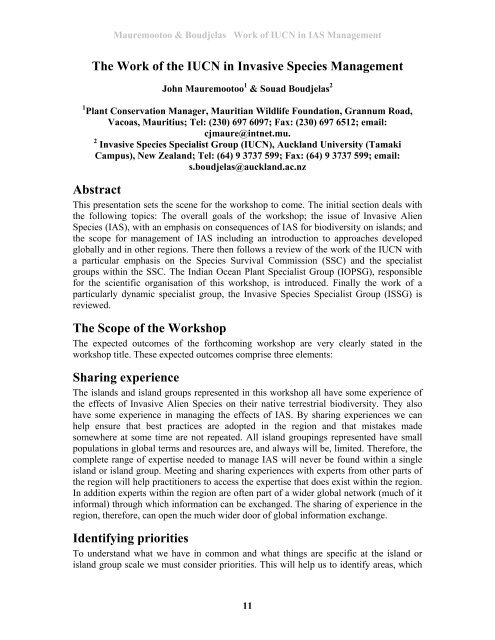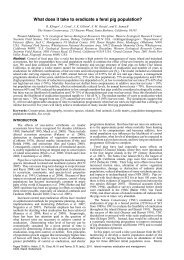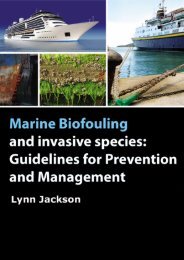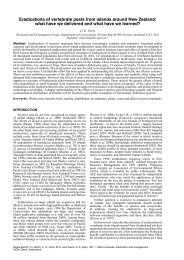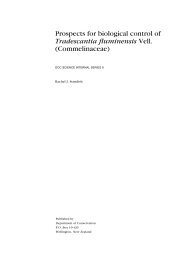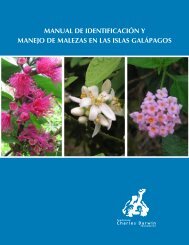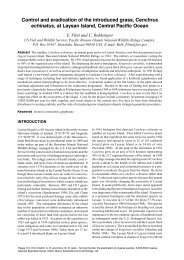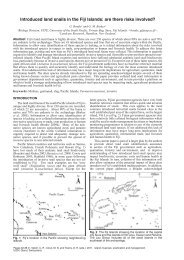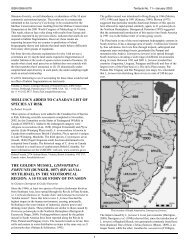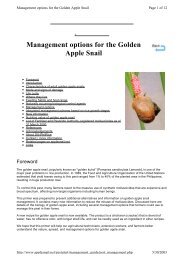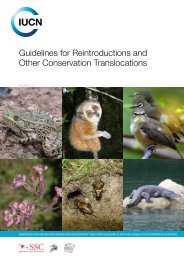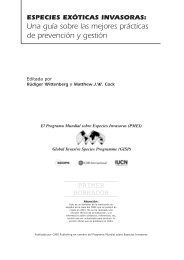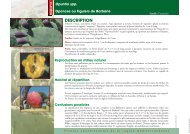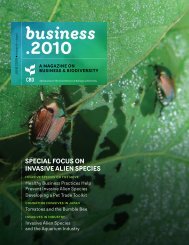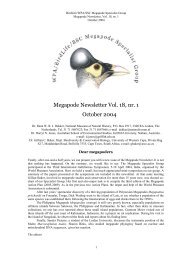Woody Invasive Species: A Regional Assessment - IUCN Invasive ...
Woody Invasive Species: A Regional Assessment - IUCN Invasive ...
Woody Invasive Species: A Regional Assessment - IUCN Invasive ...
Create successful ePaper yourself
Turn your PDF publications into a flip-book with our unique Google optimized e-Paper software.
Mauremootoo & Boudjelas Work of <strong>IUCN</strong> in IAS Management<br />
The Work of the <strong>IUCN</strong> in <strong>Invasive</strong> <strong>Species</strong> Management<br />
John Mauremootoo 1 & Souad Boudjelas 2<br />
1 Plant Conservation Manager, Mauritian Wildlife Foundation, Grannum Road,<br />
Vacoas, Mauritius; Tel: (230) 697 6097; Fax: (230) 697 6512; email:<br />
cjmaure@intnet.mu.<br />
2 <strong>Invasive</strong> <strong>Species</strong> Specialist Group (<strong>IUCN</strong>), Auckland University (Tamaki<br />
Campus), New Zealand; Tel: (64) 9 3737 599; Fax: (64) 9 3737 599; email:<br />
s.boudjelas@auckland.ac.nz<br />
Abstract<br />
This presentation sets the scene for the workshop to come. The initial section deals with<br />
the following topics: The overall goals of the workshop; the issue of <strong>Invasive</strong> Alien<br />
<strong>Species</strong> (IAS), with an emphasis on consequences of IAS for biodiversity on islands; and<br />
the scope for management of IAS including an introduction to approaches developed<br />
globally and in other regions. There then follows a review of the work of the <strong>IUCN</strong> with<br />
a particular emphasis on the <strong>Species</strong> Survival Commission (SSC) and the specialist<br />
groups within the SSC. The Indian Ocean Plant Specialist Group (IOPSG), responsible<br />
for the scientific organisation of this workshop, is introduced. Finally the work of a<br />
particularly dynamic specialist group, the <strong>Invasive</strong> <strong>Species</strong> Specialist Group (ISSG) is<br />
reviewed.<br />
The Scope of the Workshop<br />
The expected outcomes of the forthcoming workshop are very clearly stated in the<br />
workshop title. These expected outcomes comprise three elements:<br />
Sharing experience<br />
The islands and island groups represented in this workshop all have some experience of<br />
the effects of <strong>Invasive</strong> Alien <strong>Species</strong> on their native terrestrial biodiversity. They also<br />
have some experience in managing the effects of IAS. By sharing experiences we can<br />
help ensure that best practices are adopted in the region and that mistakes made<br />
somewhere at some time are not repeated. All island groupings represented have small<br />
populations in global terms and resources are, and always will be, limited. Therefore, the<br />
complete range of expertise needed to manage IAS will never be found within a single<br />
island or island group. Meeting and sharing experiences with experts from other parts of<br />
the region will help practitioners to access the expertise that does exist within the region.<br />
In addition experts within the region are often part of a wider global network (much of it<br />
informal) through which information can be exchanged. The sharing of experience in the<br />
region, therefore, can open the much wider door of global information exchange.<br />
Identifying priorities<br />
To understand what we have in common and what things are specific at the island or<br />
island group scale we must consider priorities. This will help us to identify areas, which<br />
11


